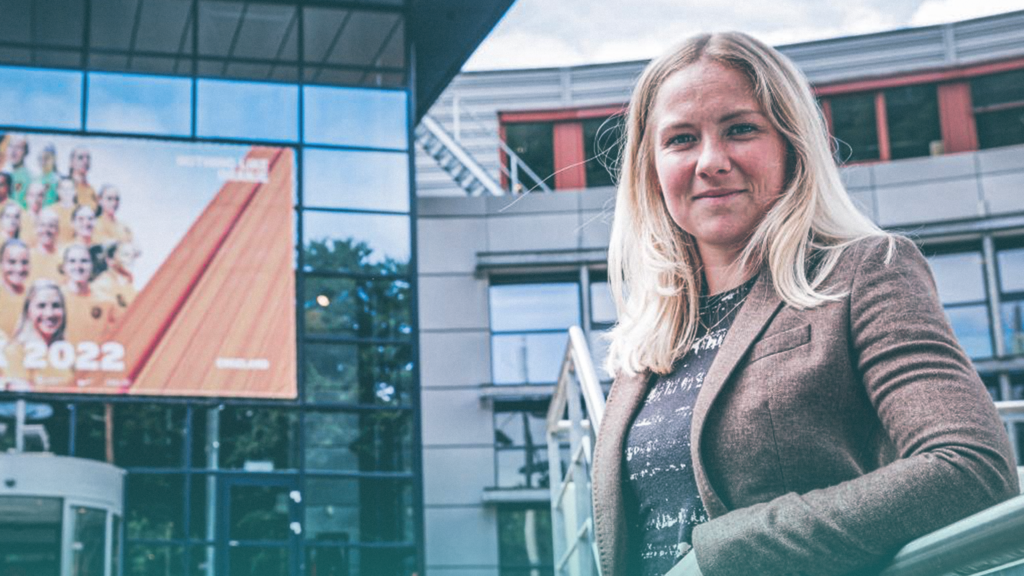
Manager of Women’s Football at the Dutch FA, Lucienne Reichardt works hard to raise the bar of the women’s game, providing equal opportunities at all levels.
She utilises her successful playing career to bring experience, knowledge and burning passion to every aspect of her work.
We spoke to her to find out more on her dreams for the women’s game.
Tell me where your love of football came from and when you started playing?
I was five-years-old when I started playing in a small city in the Netherlands, I was actually the only girl who was playing in that area.
I played with the boy’s team, after persuading the coach and then at age 16 I joined my first professional club. This was just one year after the start of the women’s professional league in the Netherlands, the Vrouwen Eredivisie.
At age 18 I was forced to leave my club as mixed football is stopped at that age in the Netherlands, so I had to show my skills off to women’s teams.
You were coached by Sarina Wiegman, what was she like and are you proud to see her continuing to succeed?
I’m a big fan of Sarina, she is an amazing person. She won the Euro with the Netherlands and that was a big opportunity for her. It was prime time when she started in England and she’s made a really good group from the players she had.
She’s really good at getting the potential out of every girl. We’re all a bit proud of her as she is Dutch and she is doing so well.
You played at West Ham in the Women’s Super League, what was that experience like?
I spent a year playing at West Ham because I wanted to experience playing abroad, before this I had only played in the Netherlands. It was nice to live in London and play in the WSL, you see the standards of football there and it is flying.
The facilities and the standards I saw still help me in my work now. The WSL is the number one league that girls want to play in. West Ham was an amazing club.
Why did you decide to complete the UEFA MIP course?
I finished my PhD and I started doing some statistical research after I’d retired from football. I soon realised how much I missed football, but I wasn’t sure how I wanted to be involved in the game.
I did some volunteer work and was a board member for a women’s team. Here I got to speak to players and share experiences, and I realised I got energy from being in that environment.
I realised I wanted to be in a management role, so MIP seemed perfect.
Do you think the programme helped you in your career, after your playing career?
Definitely! I didn’t realise that my football career already gave me experience in different things and MIP helped me to see that. It helps to give you the confidence to transfer your skills and you learn so much.
I even realised the skills I had picked up from combining football and studying.
What were the people like in your cohort?
I think you find a group for life. It’s so interesting to see their journey during MIP and after the programme, I loved coming together every session. Plus, the programme is amazing for your network.
Tell me about your role now as Manager of Women’s Football at the Dutch FA (KNVB), what does a day look like for you?
We look at where we want to be with women’s football, and we question whether we have equal opportunities for girls and we look at the professional league and how that’s going.
My role has changed recently and now I focus more on the professional league, the Women’s Eredivisie.
We also build relations with UEFA and FIFA. We are bidding for the Women’s World Cup in 2027, together with Germany and Belgium. I have much more focus in my role now and it’s great.
You’re also a member of the UEFA Women’s Football Committee, aren’t you?
I am! Our first meeting is in November and it’s an honour to be a part of this committee. I’m really looking forward to seeing what we can do with the group.
What developments have you seen in the women’s game?
It’s exploded in the last few years. I was the only girl playing when I was a child and now that’s hard to imagine.
It’s so nice that we as players have been a part of this journey and can help the little girls dreaming of playing. There’s now a place for every girl, whether it’s for fun or professional.
I think tournaments like the Euro helped a lot. You can see the level growing, especially in the World Cup where all the countries come together to play, it’s great to see.
What else needs to happen to bring the game further forward?
I think that’s the big question. I think it’s really important that the women’s game is visible. We need girls to know that they can dream of being a player. The Dutch national team is visible now but it’s important that lower leagues are the same.
We did well in the Netherlands to make the game approachable and provide equal opportunities, for example our national women’s team receive the same salary as the men.
We have to show role models at every level. That needs to be volunteers, amateur clubs, so girls can see their experience and passion for football. Everything has to be visible.
If you could speak to that five-year-old version of yourself, what would you say to her?
I would tell her to enjoy playing football and to have fun. Be yourself and you will get there.
Follow Lucienne on Twitter
Follow the MIP Alumni Association on Twitter